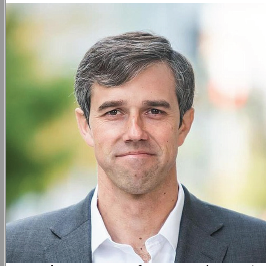Beto O’Rourke
An unsuccessful bid for the Senate rarely results in a nation-wide wave of support, much less status as a front runner for upcoming presidential elections. Yet El Paso democrat Beto O’Rourke has managed to create an impressive political narrative that inspired millions of Texans to vote in his favor. Even more spectacular is his ability to gain financial support, raising $38.1 million in his final quarter — a greater single quarter record than any other Senate candidate in history. Perhaps his incredibly well-funded campaign drew the nation’s attention initially, but it is his progressive policies and refreshing demeanor that made O’Rourke the face of the blue wave.
O’Rourke intends to meet the needs of a changing workforce by investing in training, certification programs, and education to promote domestic and high-level jobs. For low-income communities, he proposed increases in federal funding towards education. Although he hails from a fossil-fuel focused state, his Senate campaign promoted renewable energy and disagreed with Trump’s decision to withdraw from the Paris Climate Accords. O’Rourke is a longtime supporter of abortion rights and the Affordable Care Act, and he recently opposed legislation that would defund low-income family planning programs. Yet perhaps what O’Rourke is most passionate about lies in immigration reform, as he is strongly against Trump’s border wall. He has rallied protests against family separation policies and advocated for easier citizenship paths for those crossing the border.
In the era of Trump, America has become increasingly isolated from the international community — controversial foreign policy, protectionist intentions, and inflammatory immigration conversations only scratch the surface. In compilation with growing domestic divides and political polarization, the country is in dire need of genuine national unity. American exceptionalism seems increasingly hollow; the founding principles of unity and morality that once guided the leaders of this nation have diminished to mere suggestions. In Beto O’Rourke, the country has found an answer. He has proven that he can connect with more than just Democrats — his bipartisan precedent and mitigating political demeanor is reminiscent of 2007-era Obama, only complemented by support from a historically conservative Texas. His policies are strong and increasingly relevant. The American people should and will look to O’Rourke as the restorer of a truly united democracy.
Kirsten Gillibrand
Kirsten Gillibrand is becoming one of the more talked-about names for the upcoming 2020 presidential elections. Though the incumbent democratic New York Senator has neither confirmed nor denied her candidacy, her visits to rallies in states all over the country and fundraising on her reelection campaign indicate that she may be seriously considering running. Gillibrand is a Senator who is true to her constituency but outspoken on issues of personal value. With these qualities, she could become an honest, driven president with the potential to steer America in a better direction for all of the people.
Gillibrand’s political views have evolved radically since her initial election to the House in 2006. During her first few terms in Congress, she positioned herself as a relatively conservative Democrat, voting in favor of acts to increase border control and maintaining a 100% approval rating from the NRA for her anti-gun control viewpoint. However, upon being appointed to the Senate, Gillibrand began to adopt more liberal, populist views that represent the whole state of New York, and as of late, the whole country. She was the first senator to call for the abolishment of ICE and is now much more supportive of gun control. She recently voiced her support for a new tax on stock market transactions — a radical stance in a state heavy with Wall Street investors. Gillibrand shows a willingness to adapt her views for the people who live in her state; this is a strength she could apply to a greater constituency as president.
While Gillibrand has developed her opinions on some issues over time, there are others in which she is deeply rooted. One of the issues she is most widely known for is sexual assault, often being called “The #MeToo Senator.” She has been outspoken on this issue for a long time, much before it came into the national spotlight with #MeToo. Gillibrand isn’t afraid to voice her opinion on matters related to this issue, even if her sentiments stir up controversy; in fact, she led the charge for Al Franken’s resignation in 2017 and believed that Bill Clinton should have resigned over the Lewinsky scandal. Other issues that she has stood her ground on include transparency and accountability; she publishes her daily schedule in Congress along with annual tax returns. America needs a leader like Gillibrand that is unafraid to not just talk about their opinions but also act on them, all the while taking into account others’ viewpoints.
Mitt Romney
The 2020 presidential election looms closer than ever. Donald Trump will be the Republican candidate of this election, as he confirmed his bid for re-election in 2017. However, I would like to see Mitt Romney run for president in 2020.
Though Mitt Romney feeds into the privileged white male stereotype, he has frequently spoken for women’s rights. In 2012, Romney declared that every woman in America should have access to contraceptives and that it should be illegal for states to ban contraceptives. Though he is pro-life, he stated that his personal beliefs should not get in the way of federal law as it is not the government’s place to intrude on abortion rights. If he were elected in 2020, abortion rights would be secured.
Romney earns most of his income through stocks, which is concerning as he can seem detached from the working class, but his entire 2012 presidential platform centered on building the economy by creating jobs and decreasing spending. He supports “Reaganomics,” developed by former President Ronald Reagan during the 80s. In 2002, Mitt Romney announced that if he were to run for president, “clean environment” would be a significant campaign theme. We did not see this in 2012, and he has yet to make a firm stance on environmental protection when not related to big corporations, so I feel that he should speak more on this issue in the coming election cycle.
His big slogan in 2007 was “strong military, strong economy, strong families.” I agree with this sentiment, but I would argue his definition of a family. As he increases in political affluence, his stance on gay marriage has altered. He originally supported a 2007 Constitutional amendment declaring marriage a union specifically between a man and a woman, and in 2012 he stated that civil unions are legal for gay couples, but not marriage. I do not agree with this stance, but if he were elected, he would most likely focus on other issues more pressing to him, and the legality of gay marriage would not be overturned.
The U.S. would benefit from Mitt Romney as president diplomatically, economically, and potentially environmentally. We need an economically driven president — who doesn’t tweet all of his thoughts — to restore the sanctity of the executive branch. Mitt Romney can be that president.
John Kasich
John Kasich — who is currently finishing up his second term as Ohio’s governor — “is seriously considering” running for president in 2020. Although he was unsuccessful in winning the GOP candidacy bid in both 2000 and the most recent presidential election, nothing is stopping him from making another attempt at the presidency. His long and successful political history certainly qualifies him for president, and his open criticism of the Trump’s productivity will certainly stimulate competition. The only thing he may lack is a strong ability to appeal to the people, which ultimately led to his defeat in 2000 and 2016. However, he may be able to act as a rallying cry for all Republicans.
Since Donald Trump’s inauguration in 2016, Kasich has become concerned with the future of the GOP. In Kasich’s view, the election of Trump represented a widespread abandonment of good American values. By running, Kasich hopes to reestablish the meaning of American ideals and save the GOP’s reputation. To do so, however, he needs funding. In the 2016 election, Kasich only raised $37 million (four times less than the next candidate). Thus, Kasich must boost his funding massively if he wants to compete with Donald Trump.
Despite a significant underperformance in the polls during the 2016 presidential election, Kasich has been an overall success for his home state Ohio. Kasich was elected governor in 2010, and throughout the campaign process, he made promises to expand gun rights, phase out personal income tax, and raise education standards. As he approaches the end of his tenure, it is evident that he successfully kept his promises and fulfilled his goals as governor. Despite his past failure in the presidential elections, Kasich has always been honest when making promises to the people. His time as Ohio’s governor shows his ability to work with his advisors to fulfill obligations to the people, which will make him a potential threat to the current president in 2020.
Although his chances at defeating Trump in the GOP race are slim, there is no doubt that Kasich will campaign to restore the American values he believes Trump has ignored — don’t be surprised to see John Kasich’s name on the ballot in the 2020 presidential primaries.








